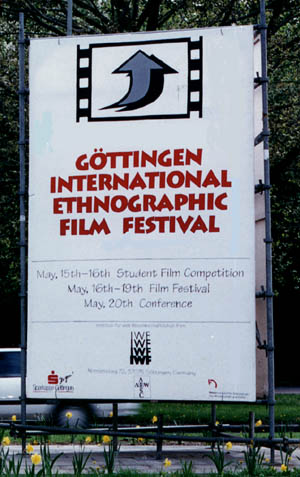Report on the 4th Göttingen International Ethnographic Film Festival
May 20th - May 25th 1998

For the 4th time now, the Göttingen International Film Festival has been successfully organized. A total of 11 student and 31 ethnographic productions by more than 30 cultures were presented. Most of the authors and/or the directors from 20 countries were present. 350 visitors from science and public, from Göttingen, Germany, Europe and overseas were given the possibility to meet and discuss new developments in ethnographic film making. The subsequent workshop "Authorship in the face of Electronic Media" was concerned with current problems of electronic media diffusion. The festival was financially substituted by the land Lower Saxony, the Sparkasse Göttingen and the town Göttingen. Sony Broadcast Germany once again donated the student film award.
The festival began with the students competition, which deliberately offers the rising generation a chance to match with other productions in a competitive situation. That was followed by the main festival, which was once again free from competition and instead concentrated on intensive discussions with the film makers, that were held after the end of each film. The main emphasis was set on the connecting function of the institute between West- and East (-Europe as well as the Far East).
More than 140 films had been notified to the festival, amongst those more than 30 students contributions. In February 1998, the films were selected and arranged to a festival-programme by an international selection committee consisting of the following 6 members:
- the visual anthropologist Peter Crawford (Aarhus University/Denmark)
- the head of the audiovisual laboratory of the Ljubljana University/Slovenia, Nasko Kriznar
- the media scientist and africanist Philippe Lourdou (Paris University)
- the organiser of the "Filmforum third world" in Freiburg, Gudula Meinzolt
- the folklorist Ruth Mohrmann (M¨nster University) (for the student selection represented by the folklorist and film maker Edmund Ballhaus, Göttingen University)
- the ethnologist Frode Storaas (Bergen University/Norway).

The selected programme consisted of 42 films dealing with more than 30 different cultures and societies. Ethnologists and film makers from 20 countries as well as about 300 additional visitors came to the IWF between the 20th and the 25th of May. Next to a lot of guests from Göttingen, a pleasingly high share of young participants could be perceived, most of them being students of German universities which teach ethnology, folklore and cultural studies. With that the festival demonstrated it's special value as a meeting place for the rising academic generation with established film makers and visual anthropologists.
On the 20th of May the festival began with the students competition, which consisted of 11 films. They presented subjects from Chile, Germany, Siberia, Morocco, Austria, Cuba, Hungary and Slovakia. The authors, most of which were present, came from Denmark, Germany, Great Britain, Morocco, Australia and Hungary.
A three headed Expert jury decided about the "Student Award" giving. Those were Sarah Elder (New York state University/USA), the president of the Commission on Visual Anthropology Antonio Marazzi (Padua University/Italy) and Manfred Krüger (IWF/Germany). The presence of the two young Moroccan ethno-film makers Azeddine Detsouli and Mehdi Kadmiri, whose production "Middle Atlas Modesty" woke a lot of interest because of it's playful handling of documentary and feature elements, was appreciated very much by both the organizers as well as the audience. The two students contributions by graduates of the University of Film and Television 'Konrad Wolf' in Potsdam-Babelsberg were also remarkable: "Negative Nights" about young people in Budapest and "Who's last in line" about a Cuban musician. The Slovakan 16mm production 'Feathered Season' on carrier pigeons gained appreciation on high filmic aestetics and exellent film formation.

The jury eventually decided to give the "Student Award" to the hungarian production 'Exclusive Suburb' by Zoltan Füredi. Sony Broadcast Germany had placed a SONY-DV-Camera at disposal.
The main festival took place between the 21st and 24th of May and presented the audience 31 films. Their authors came from the United States, Canada, China, Taiwan, France, Latvia and other countries. As special guest the Samoan embassador for western Europe, his excellence Tauiliili Uili Meredith had come from Brussels to attend the worlds premi?re of the 16mm film 'Destination Samoa - New Zealand Samoans Between Two Cultures' by Peter Mesenh?ller and Rolf Husmann. In addition to that, a 9 headed delegation of the 'Chinese Association for Visual Anthropology' had come from China to participate in the festival and exchange thoughts and ideas.
The festivals programme reflected a wide variety of ethnologic film making and of documentary film making with ethnographic content. Amongst those were classic ethnologic films such as Ivo Streckers "Father of the Goats" about the Hamar in South Ethiopia or "Himalayan Herders" by John and Naomi Bishop about Central Nepal as well as the filmic work off of ethnographically critical subjects such as "Al Karamah" of the norwegian Frode Storaas about problems of palestinians in Israel, "Father, Son and Holy Torum" by the estonian ethnologist Mark Soosaar about environmental problems and the expropriation of indigenous inhabitants of Siberia and "Trinkets and Beads" by Christopher Walker about the exploitation of ecuadorian indians by petrol companies and ethnologists!
During the complete festival, a "Video Library" was opened in a separate room. Here the visitors had the opportunity to watch all the films that had been notified to the festival- provided that they were able to gain a seat in the constantly occupied room.
Under the organisation of Beate Engelbrecht, 30 partitioners met on the 25th of May for a workshop with the content "Authorship in the Face of Electronic Media". Oral presentations were given by Sarah Pink (Derby University/Great Britain) on Ethnography, Authorship, Experience and Electronic Text; Rane Willerslev (Aarhus University/Denmark) on Towards a New Anthropological Research Method; Andreas Bresler (Göttingen University/Germany) on Native Americans and the Internet; Rachel Robertson (Granada Centre of Visual Anthropology, Manchester University/Great Britain) on Attempts to Controll the Media; Alanis Obomsawin (National Film Board of Canada) on What the Future Will Be; Fan Zhi Ping (Yunnan TV Station/China) on New Developments in Chinese Visual Anthropology and Sarah Elder (New York state University/USA) on Ownership and Authorship. As debators took part: Hu Tai Li (Institute of Ethnology, Taipei/Taiwan); Penny Moore (Australian Institute of Aboriginal and Torres Strait Islanders Studies); Chris Walker (USA); Marc Woolstencroft (Granada Centre of Visual Anthropology, Manchester University).
Responsible for the organisation were Dr. Beate Engelbrecht and Dr. Rolf Husmann (both IWF). Employed by a 6 months' time contract, Mrs. Petra Engelhardt did most of the work as the organisational head. The team of technicians, administrators and other IWF colleagues aswell as a large group of student helpers made sure that the festival took place without disturbances.
The festival ended on the 25th of May, but the organisers had decided to extend the festival by further presentations of the films in a "Travelling Festival". Due to that some films were already presented in the 'Lumière'-cinema in Göttingen (to enlargen the film audience in Göttingen), in Kassel and in Hannover.
In the days and weeks succeeding the festival, films of the programme could be seen in üünster, Cloppenburg, Hamburg, Berlin, Saarbrücken and in the Siberian cities Salekhard and Perm aswell as at the University of Malta.
This large inquiry, but especially the rush in Göttingen during this 4th festival and numerous comments of participants and authors encouraged the organisers in their impression, that the Göttingen International Film Festival has already gained a place in the international festival calendar concerning documentary film and ethnology.
